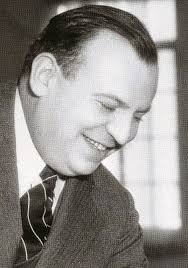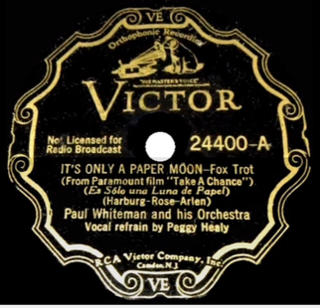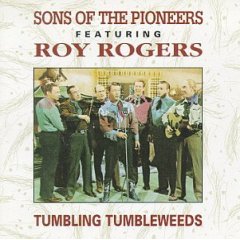
Harry Warren was an American composer and the first major American songwriter to write primarily for film. He was nominated for the Academy Award for Best Original Song eleven times and won three Oscars for composing "Lullaby of Broadway", "You'll Never Know" and "On the Atchison, Topeka and the Santa Fe". He wrote the music for the first blockbuster film musical, 42nd Street, choreographed by Busby Berkeley, with whom he would collaborate on many musical films.

Alexander Dubin was an American lyricist. He is best known for his collaborations with the composer Harry Warren.
"Boulevard of Broken Dreams" is a 1933 hit song with lyrics by Al Dubin and music by Harry Warren. Deane Janis with Hal Kemp's Orchestra recorded the original version on October 31, 1933, in Chicago, which was issued by Brunswick Records. In 1934, a rendition sung by Constance Bennett appeared in the film Moulin Rouge, but was unreleased on record.
"Lullaby of Broadway" is a popular song with music written by Harry Warren and lyrics by Al Dubin, published in 1935. The lyrics salute the nightlife of Broadway and its denizens, who "don't sleep tight until the dawn."

Gold Diggers of 1933 is an American pre-Code musical film directed by Mervyn LeRoy with songs by Harry Warren (music) and Al Dubin (lyrics). The film's numbers were staged and choreographed by Busby Berkeley. It starred Warren William, Joan Blondell, Aline MacMahon, Ruby Keeler, and Dick Powell. It featured appearances by Guy Kibbee, Ned Sparks and Ginger Rogers.
"Zing a Little Zong" is a popular song written by Harry Warren, the lyrics by Leo Robin. The song was published in 1952 and written for the 1952 movie Just for You where it was performed by Bing Crosby and Jane Wyman. It was nominated for the Academy Award for Best Original Song of 1952 but lost out to "High Noon".
The Decca record by Crosby and Wyman was cut on May 8, 1952 and was in the Billboard charts for six weeks with a peak position of #18.
"Prisoner of Love" is a 1931 popular song, with music by Russ Columbo and Clarence Gaskill and lyrics by Leo Robin.
"Painting the Clouds with Sunshine" is a popular song published in 1929. The music was written by Joe Burke and the lyrics by Al Dubin for the 1929 musical film Gold Diggers of Broadway when it was sung by Nick Lucas. Gold Diggers of Broadway is a partially lost film, and the scene featuring the song is one of the only surviving scenes of the movie.

"It's Only a Paper Moon" is a popular song published in 1933 with music by Harold Arlen and lyrics by Yip Harburg and Billy Rose.

"By the Light of the Silvery Moon" or "By the Light of the Silv'ry Moon" is a popular love song. The music was written by Gus Edwards, and the lyrics by Edward Madden. The song was published in 1909 and first performed on stage by Lillian Lorraine in the Ziegfeld Follies of 1909. It was one of a series of moon-related Tin Pan Alley songs of the era. The song was also used in the short-lived Broadway show Miss Innocence when it was sung by Frances Farr.
"You're Getting to Be a Habit with Me" is a 1932 popular song with music by Harry Warren and the lyrics by Al Dubin, which became a standard. The lyrics of the song were noted for its references to addiction.

"I'll Get By (As Long as I Have You)" is a popular song with music by Fred E. Ahlert and lyrics by Roy Turk that was published in 1928. Versions by Nick Lucas, Aileen Stanley and, most successfully, Ruth Etting, all charted in America in 1929.

"Somebody Loves Me" is a popular song, with music written by George Gershwin, and lyrics by Ballard MacDonald and Buddy DeSylva. The song was published in 1924 and featured in George White's Scandals of 1924.
"Wrap Your Troubles in Dreams" (also known as "Wrap Your Troubles in Dreams (and Dream Your Troubles Away)") is a popular song written by Harry Barris with lyrics by Ted Koehler and Billy Moll, published in 1931.

"Everybody Loves My Baby", also known as "Everybody Loves My Baby, but My Baby Don't Love Nobody but Me", is a popular and jazz standard song composed by Spencer Williams in 1924. Lyrics were written by Jack Palmer.
"42nd Street" is the title song from the 1933 Warner Bros. backstage musical film 42nd Street, with music by Harry Warren and lyrics by Al Dubin. The song was published in 1932. It is the finale of the film, where it was sung by Ruby Keeler, Dick Powell and ensemble. It was used again in 1980 when the film was adapted as a long-running Broadway musical. In 2004 the song placed #97 in AFI's 100 Years...100 Songs survey of the top tunes in American cinema.

"Out of Nowhere" is a popular song composed by Johnny Green with lyrics by Edward Heyman and published by Famous Music. It was popularized by Bing Crosby, and was the first recording under his Brunswick Records contract. He recorded it on March 30, 1931 and it became his first number one hit as a solo artist. Crosby also sang it in the film Confessions of a Co-Ed (1931) and in his short film I Surrender Dear (1931). He recorded it again in 1954 for his album Bing: A Musical Autobiography.

"Tumbling Tumbleweeds" is a Western music song composed by Bob Nolan, a founding member of the Sons of the Pioneers. Nolan wrote the song in the early 1930s while he was working as a caddy and living in Los Angeles. It was first recorded by the Sons of the Pioneers in 1934, and it became one of the most famous songs associated with the group. Originally titled "Tumbling Leaves", the song was reworked into the title "Tumbling Tumbleweeds" and into more widespread fame with the 1935 film of the same name starring Gene Autry. Members of the Western Writers of America chose it as one of the Top 100 Western songs of all time.
"For You" is a song written by Joe Burke and Al Dubin in 1930. It was introduced in the Mack Sennett short Billboard Girl (1932) when it was sung by Bing Crosby. The best known version was from musician Rick Nelson in 1964, when it peaked at #6 on the Billboard Hot 100 and at #66 on the year end. In 1964, Vic Laurens made à beautiful French version. Title of the song : Pour toi on label Mercury.
"Between the Devil and the Deep Blue Sea" is an American popular song published in 1931, with music by Harold Arlen and lyrics by Ted Koehler, and first recorded by Cab Calloway in 1931. It was introduced in the 1931 Cotton Club show Rhythmania and is now a widely recorded standard.











